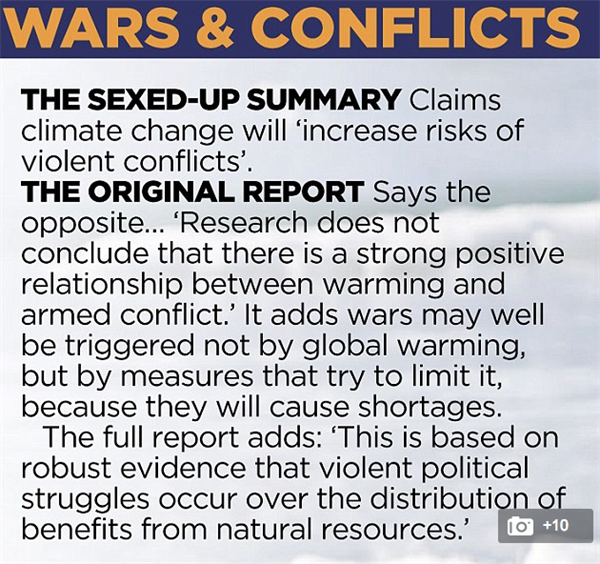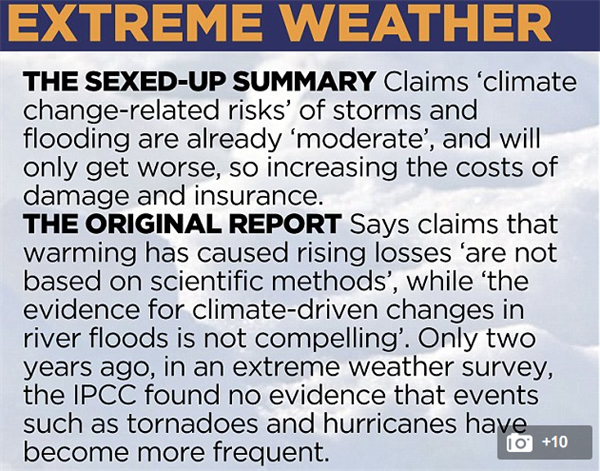Mat Hope
07.04.2014 | 5:30pmIn an article in this weekend’s paper, the Mail on Sunday accuses the Intergovernmental Panel on Climate Change (IPCC) of ‘sexing up’ its findings in the short ‘summary for policymakers’ that accompanies its latest report. But the IPCC responded this morning, saying the Mail on Sunday “misleads the reader by distorting the carefully balanced language of the document”.
In an effort to help policymakers and the public engage with its mammoth scientific reports, the IPCC produces a summary – the Summary for Policymakers (SPM). It tries to present the report’s overall conclusions in a shorter and more accessible format.
The Mail on Sunday has done a comparison between the SPM, and quotes it claims come from the full IPCC report. The article says the SPM puts an “alarmist spin” on the findings, but the IPCC has today rejected that charge in a statement.
We’ve looked at the source material to see what the report has to say, and how the Mail on Sunday has interpreted (or misinterpreted) it.
Wrong chapter, misleading attribution
The Mail on Sunday says the IPCC’s SPM over-emphasises the extent to which climate change is expected affect a range of other issues, starting with how it could force migration as extreme weather hits people’s local environments.
But the IPCC defends the SPM’s finding, saying the Mail on Sunday has cherrypicked quotes that don’t reflect the report’s overall conclusions.
Here is the Mail on Sunday’s accusation:
The IPCC says the Mail on Sunday ignores important evidence on migration in the report that supports the SPM statement.
For instance, chapter 12 – which focuses on climate change’s effect on human security – says:
“Major extreme weather events have in the past led to significant population displacement, and changes in the incidence of extreme events will amplify the challenges and risks of such displacement”.
Chapters 9, 19, 22, and 25 also contain research that links the risks posed by climate change to increased migration and displacement.
The quote about “alarmist predictions” of “environmental migrants” that the Mail on Sunday contrasts with the SPM is taken from chapter 9, which focuses on rural impacts. The Mail on Sunday’s chosen quote comes from a summary of the conclusions of a single paper – one of more than 500 reviewed by the IPCC in the chapter – and doesn’t represent the report’s overall findings, the IPCC points out.
Opposite conclusion
The Mail on Sunday goes on to claim that the IPCC summary overstates climate change’s influence on the chances of violent conflict.
But the IPCC points to “many references to publications and statements in the report showing the opposite conclusion”.
The Mail on Sunday says:
The quote the Mail on Sunday attributes to the report’s summary is shortened and removes some important context. The full quote reads:
“Climate change can indirectly increase risks of violent conflicts in the form of civil war and inter-group violence by amplifying well-documented drivers of these conflicts such as poverty and economic shocks (medium confidence)”.
The Mail on Sunday’s edit makes it look like the IPCC is saying climate change directly causes conflict.
But the full quote reveals that the IPCC is talking about how climate change indirectly affects potential causes of such conflicts, such as poverty.
The Mail on Sunday makes a similar mistake when it looks at climate change’s impact on crop yields.
The Mail on Sunday says global harvests have increased, while it claims IPCC’s SPM says climate change will reduce crop yields. But the Mail on Sunday is looking at global data, while the IPCC focuses on a more local level.
The IPCC acknowledges that crops will be affected in different ways in different places, citing research predominantly looking at local, not global, trends. It says that climate change’s impact on local harvests has so far been negative more often than it has been positive in different places across the globe.
Picking regions
Finally, the Mail on Sunday accuses the IPCC of attributing extreme weather such as floods and storms to climate change, saying the panel previously found little evidence for the link.
In fact there is no disagreement between the summary and the report – the IPCC’s report conclude that the risk of such events increases as as the climate warms.
The SPM says:
“Climate-change-related risks from extreme events, such as heat waves, extreme precipitation, and coastal flooding, are already moderate (high confidence) and high with 1°C additional warming (medium confidence). Risks associated with some types of extreme events (e.g., extreme heat) increase further at higher temperatures (high confidence).”
In another passage, it says policymakers should be concerned about the impacts of climate change because of the “[r]isk of death, injury, ill-health, or disrupted livelihoods in low-lying coastal zones and small island developing states and other small islands, due to storm surges, coastal flooding, and sea-level rise”.
This is partly based on evidence that was presented in a previous IPCC report, released last September.
The SPM for that report said scientists expect there to be longer and more intense heat waves, and more frequent and/or intense heavy rainfall events. They also predict more hurricane activity in some parts of the world, and longer and/or more intense drought.
The quote the Mail on Sunday suggests provides evidence that “changes in river floods is not compelling” comes from a section specifically looking at North America, not the whole world ( chapter 10, section 7).
But when the lens is widened, “[t]he fraction of global population experiencing water scarcity and the fraction affected by major river floods increase with the level of warming in the 21st century”, the SPM says (reflecting findings throughout the report).
Misleading and distorted
The IPCC says the Mail on Sunday’s article gives “a completely misleading and distorted impression of the report through selective quotation”. Having gone back and looked at the report it seems the IPCC has a point.




